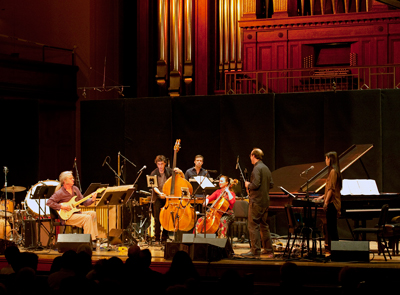by Mike Telin

Since playing their first marathon concert in a SoHo art gallery on Mother’s Day in 1987, the composers/performers collective, Bang on a Can, has grown into one of the world’s premier arts organization. It inspires and fosters the growth of young composers and musicians as well as bringing contemporary music to audiences world-wide. In addition to the All-Stars, their programs include the annual Bang on Can Marathon, The People’s Commissioning Fund, the Summer Music Festival at MASSMoCA, the Asphalt Orchestra, and Found Sound Nation, a technology-based program which led to the creation of OneBeat, a residency that brings American musicians together with young musicians from developing countries.
By the middle of David Lang’s Sunray, which opened the program on Saturday, it was clear that Ashley Bathgate (cello), Robert Black (bass), Vicky Chow (piano), David Cossin (percussion), Mark Stewart (electric guitar) and Ken Thomson (clarinet and saxophone) are all extraordinary musicians who possess abundant technique. Here, and throughout the evening, the ensemble continually tossed off extremely complicated rhythmic passages as though they were a walk in the park. Do they each have surgically implanted metronomes? After Sunray’s initial sliver of light evolved into an intense ball of fire and the final chord had dissipated, Lang, who was present at the concert, acknowledged the applause of the large and appreciative audience.
Like Sunray, Julia Wolfe’s Believing is a rhythmic tour de force for the players. In addition to negotiating some fiendishly difficult technical passages, the piece required them to vocalize as well during the placid middle section. Thompson’s wailing clarinet calls added spice to the work’s thick texture.
Created through the People’s Commissioning Fund, Kate Moore’s Ridgeway is a pastoral and introspective work inspired by the composer’s journey back to her hometown in Oxfordshire, U.K. The long fading of the final chord brought this musical kaleidoscope to a fitting conclusion.
Michael Gordon’s For Madelin is a collision of complicated rhythms — two separate rhythmic structures that simultaneously move from its beginning to its end. The piece delivers a copious supply of glissandos before concluding quietly with the clarinet.
The highlight of the 70-plus-minute set, was Steve Martland’s jazz-rock-influenced Horses of Instruction. Here, bassist Robert Black abandoned his acoustic bass in favor of an electric one, and Thomson traded in his clarinet for a tenor sax, adding a wonderful change of color to the All-Stars’ sound during the rhythmically intricate, up-tempo piece. The energy in the audience was palpable. The players appeared to be having a good time as well, swaying back and forth, while Thompson jumped up and down to the driving beat.
The aptly-titled final work was Philip Glass’s Closing. Although it was wonderfully performed, and is a work near and dear to Bang on a Can, it proved to be something of a anticlimax after the Martland.
Earlier in the day, David Lang and his All-Star colleagues participated in an insightful career development session for students. Each musician talked about the circuitous routes their careers had taken on the way to joining the group. David Lang encouraged people to identify a need and figure out how to fill it. He pointed out that he and his Bang on a Can co-founders began with one goal in mind. “We thought that there really needed to be an organization that would try to do as much for experimental music as we could think of. No one was going to do it unless we did, so we created it.”
Photo by Walter Novak.
Published on ClevelandClassical.com March 4, 2015.
Click here for a printable copy of this article


